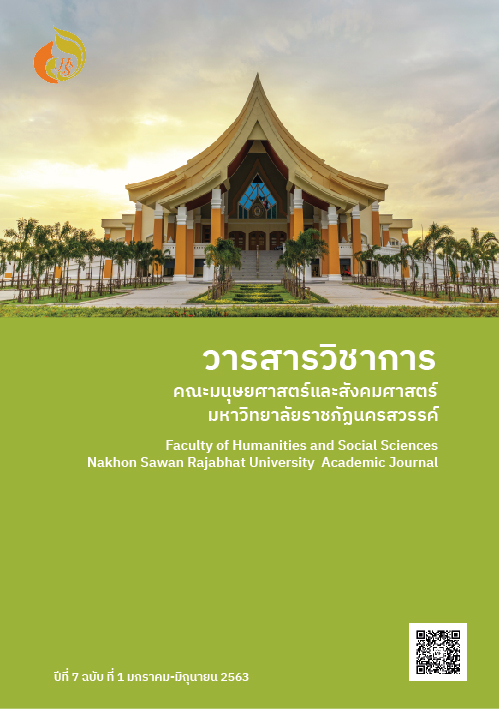แนวทางการศึกษาปฏิบัติการในชีวิตประจำวันของวัยรุ่นมุสลิมในสามจังหวัดชายแดนใต้
Main Article Content
บทคัดย่อ
จากเดิมในการศึกษาเกี่ยวกับอัตลักษณ์ของกลุ่มวัยรุ่นมุสลิมในสามจังหวัดชายแดนใต้ มักถูกมองในเชิงตีตราและเป็นความเบี่ยงเบนแปลกแยกไปจากขนบธรรมเนียมวิถีชีวิตของที่ควรจะเป็น โดยการศึกษาจำนวนมากเกี่ยวกับมุสลิมนั้น ยังคงเป็นการศึกษาเพื่อตอบคำถามที่ว่ามุสลิมคือใคร มีลักษณะทางสังคมวัฒนธรรมอย่างไร และควรจะปฏิบัติต่อไปอย่างไร ซึ่งเป็นการศึกษาสังคมและวัฒนธรรมมุสลิมแบบหยุดนิ่งตายตัวและมีคำตอบสำเร็จรูป ดังนั้นบทความชิ้นนี้จึงมุ่งเสนอให้เห็นความสำคัญของการศึกษาเกี่ยวกับมุสลิมในสังคมไทยโดยเฉพาะการศึกษาเรื่องอัตลักษณ์ผ่านกลุ่มมุสลิมวัยรุ่นด้วยแนวคิดปฏิบัติการในชีวิตประจำวัน (Practice of Everyday Life) ของ de Certeau ด้วยการวิเคราะห์เอกสาร เพื่อเป็นกรอบแนวคิดในการทำความเข้าใจวัยรุ่นมุสลิมในแง่มุมความคิด การให้ความหมาย ความรู้สึก รวมถึงการใช้ชีวิตประจำวันของพวกเขา ซึ่งความสำคัญของแนวคิดนี้ คือการวิเคราะห์กลุ่มวัยรุ่นเหล่านี้ในฐานะของผู้มีศักยภาพในการเป็นผู้กระทำการ (agency) ว่าพวกเขาให้ความหมายกับสิ่งที่ทำอย่างไรและพวกเขาใช้มันเพื่อต่อรองกับวัฒนธรรมเดิมและความเปลี่ยนแปลงทางสังคมและวัฒนธรรมในปัจจุบัน
Article Details
เอกสารอ้างอิง
การียา ยือแร, สาวิตรี ลิ้มชัยอรุณเรือง และเพชรน้อย สิงห์ช่างชัย. (2010). การส่งเสริมการออกกำลังกายตามหลักศาสนาอิสลามในกลุ่มแม่บ้านจังหวัดปัตตานี. AL-NUR JOURNAL OF GRADUATE SCHOOL, FATONI UNIVERSITY, 5(9), 83-92.
เก็ตถวา บุญปราการ. (2553). ปฏิบัติการในชีวิตประจำวันของผู้ค้ามุสลิมข้ามแดนปาดังเบซาร์ไทย-มาเลเซีย. Journal of Liberal Arts Prince of Songkla University, 2(1), 1-25.
เกษตรชัย และหีม, และดลมนรรจน์ บากา. (2012). ปัจจัยเสี่ยงที่ส่งผลต่อพฤติกรรมก้าวร้าวของเยาวชนไทยมุสลิมในสามจังหวัดชายแดนภาคใต้. NIDA Development Journal, 51(3), 59-90.
คะนึงนิจ พรมนัส, และพัชรินทร์ ลาภานันท์. (2017). การต่อรอง ปฏิบัติการในชีวิตประจำวัน และอำนาจในตลาดชายแดนไทย-กัมพูชา กรณีศึกษาแรงงานเข็นรถรับจ้างขนสิ้นค้าชาวกัมพูชา ตลาดโรงเกลือ อำเภออรัญประเทศ จังหวัดสระแก้ว. Journal of Mekong Society. 13(3) : 151-174 doi: 10.14456/jms.2017.29
ไชยณรงค์ เศรษฐเชื้อ. (2552). กลยุทธ์ปฏิบัติการในชีวิตประจำวันของแรงงานข้ามชาติจากชายแดนกัมพูชา-ลาวที่ทำงานในประเทศไทยภายใต้กระแสการพัฒนาอนุภูมิภาคลุ่มน้ำโขง. วารสารลุ่มน้ำโขง, 5(2), 23-44
ไชยรัตน์ เจริญสินโอฬาร. (2549) รัฐ-ชาติกับ (ความไร้) ระเบียบโลกชุดใหม่. กรุงเทพฯ : วิภาษา
ฐิติญา วิมลวัฒน์. (2557). การจัดการอาหารในระดับครอบครัวตามวิถีมุสลิมและกระบวนการขับเคลื่อนเพื่อให้เกิดความมั่นคงทางอาหารในครอบครัว: กรณีศึกษาชุมชนบ้านชาใจ อำเภอไชโย จังหวัดอ่างทอง. Journal of Social Development วารสารพัฒนาสังคม, 15(2).
ณัฐวัชร์ เผ่าภู่. (2012). สุขภาพกับชีววิถีของมุสลิม: ศึกษากรณีชุมชนสมอเอก. Health and Muslim Way of Life: Case of Samoreak. NIDA Development Journal, 52(1), 189-208.
แพร ศิริศักดิ์ดำเกิง. (2558). ชีวิตมุสลิมใน "รังยาเสพติด" : ความปกติที่ต้องต่อรองในชุมชนแห่งหนึ่งในภาคใต้ของประเทศไทย (วิทยานิพนธ์ดุษฎีบัณฑิต). กรุงเทพฯ: มหาวิทยาลัยธรรมศาสตร์
วันเพ็ญ สุภาจันทร์, เก็ตถวา บุญปราการ และเอมอร เจียรมาศ. (2556). ปฏิบัติการในชีวิตประจำวันผ่านพื้นที่การแต่งงานข้ามชาติพันธุ์. Journal of Liberal Arts Prince of Songkla University, 5(1), 76-89.
วิภาวี พงษ์ปิ่น. (2555). ยุวมุสลิมมะห์ ศรัทธา กับภาวะสมัยใหม่ (วิทยานิพนธ์มหาบัณฑิต). กรุงเทพฯ: มหาวิทยาลัยธรรมศาสตร์.
สมัคร์ กอเซ็ม. (2560). ปอแนใต้ปอเนาะ : ชาติพันธุ์วรรณาย้อนมองดูตัวเองของ“เควียร์มุสลิม”และความทรงจำวัยเด็กในโรงเรียนสอนศาสนา. Thammasat Journal of History, 4(1).
สโรชพันธุ์ สุภาวรรณ์. (2559). ปฏิบัติการในชีวิตประจําวันกับการต่อรองอัตลักษณ์ ของผู้สูงอายุ. วารสารสังคมศาตร์มนุษยศาสตร์มหาวิทยาลัยเกษตรศาสตร์., 34-58
เสาวนีย์ จิตต์หมวด. (2535) วัฒนธรรมอิสลาม. พิมพ์ครั้งที่ 3 กรุงเทพฯ : ทางนำ.
หะสัน หมัดหมาน. (2536). ควรมองสังคมมุสลิมอย่างไร: กรณีสังคมจังหวัดชายแดนภาคใต้. วารสารทักษิณคดี, 49-59.
อัสรี มาหะมะ. (2560). มลายูมุสลิมกับกระบวนการทำให้เป็นไทย. Journal of Social Sciences, Faculty of Social Sciences, Chiang Mai University, 29(1), 127-159.
อาดีช วารีกูล, จำเริญ แสงดวงแข และนพพร ด่านสกุล. (2549). ศึกษาการผสมผสานทางวัฒนธรรมระหว่างชาวไทยพุทธกับชาวไทยมุสลิมบ้านนาทับ ตำบลนาทับ อำเภอจะนะ จังหวัดสงขลา. วารสารปาริชาต (ฉบับบัณฑิตศึกษา), 77-81.
Laeheem, K. (2013). The Islamic way of youth care by Muslim leaders in the three southern-border provinces of Thailand. Asian Social Science, 9(10), 160.
Laeheem Kasetchai. (2016). Relationships between Islamic ethical behavior and Islamic factors among Muslim youths in the three southern borders provinces of Thailand. Kasetsart Journal of Social Science, 1-7.
Laeheem, K. (2017). Guidelines for correcting behavior incongruent with the Islamic way of life among risk groups of Muslim youth in the three southern border provinces of Thailand. Kasetsart Journal of Social Sciences.
Laeheem, K. (2018). Approaches to promoting Islamic ethics in adherence to the faith among Thai Muslim youths in Pattani province, Southern Thailand. Kasetsart Journal of Social Sciences.
Lamont, M. (1987). The Practice of Everyday Life. Michel de Certeau , Steven F.Rendall. American Journal of Sociology, 93(3), 720–721. doi:10.1086/228800
Laura M. Ahearn. (1999). Agency. Journal of Liguistic Anthropology, Vol.9 No. 1/2, 12-15.
Santasombat, Y. (2008). Power, Space and Ethnic Identities: Cultural Politics of Nation-State in Thai Society. Bangkok: Princess Maha Chakri Sirindhorn Anthropology Centre (Public Organisation).
Suwannathat-Pian, K. (2008). National identity, and “Sam-Sams” of Satun, and the Thai Malay Muslims. Thai south and Malay north: Ethnic interactions on a plural peninsula, 155-172.
Tuansiri, E. (2018). In the name of Identity : Islam Melayu Patani. Songkhlanakarin Journal (Social and Humanity), 23(3), 49-83


